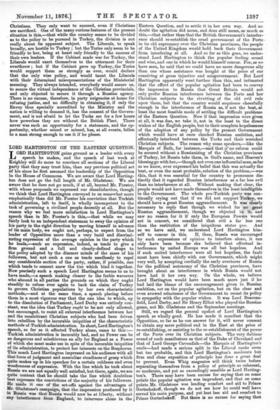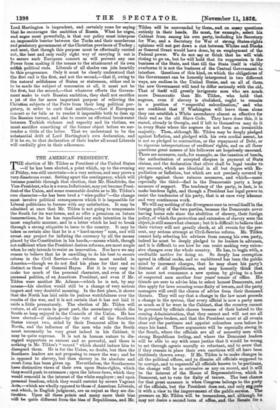LORD HA.RTINGTON ON THE EASTERN QUESTION.
LORD HARTINGTON gains ground as a leader with every speech he makes, and the speech of last week at Keighley will do more to convince all sections of the Liberal party that they may trust him, than any previous political act of his since he first assumed the leadership of the Opposition in the House of Commons. We are aware that Lord Harting- ton does not go the full length of Mr. Gladstone. We are aware that he does not go much, if at all, beyond Mr. Forster, with whose proposals we expressed our dissatisfaction, though we think that Lord Hartington conveyed to us somewhat more emphatically than did Mr. Forster his conviction that Turkish administration, left to itself, is wholly incompetent to the task of governing a civilised people decently at all. But the reason why we feel more satisfaction in Lord Hartington's speech than in Mr. Forster's is this,—that while we may fairly look to an independent statesman to sway the opinion of his party in the right direction by moving himself in advance of its main body, we ought not, perhaps, to expect from the leader of Opposition more than a very lucid and discrimi- nating expression of the average opinion in the party which he leads,—such an expression, indeed, as tends to give a firm ground and a full and clearly-defined shape to the policy adopted by the dimmer minds of the mass of his followers, but not such a one as tends needlessly to repel any considerable section of the party, rather, if possible, one which tends to cement anew the ties which bind it together. Now precisely such a speech Lord Hartington seems to us to have made,—a speech making clearer to the feeble waverers who abound in all parties the grounds on which they ought steadily to refuse ever again to back the claim of Turkey to govern Christian populations by her own characteristic methods,—and at the same time, a speech placing before them in a most vigorous way that the one idea to which, up to the dissolution of Parliament, Lord Derby was entirely con- • stant, was the idea that Turkey ought to be not only allowed, but encouraged, to resist all external interference between her and the recalcitrant Christian subjects who had been driven into rebellion by the incurable iniquities of the characteristic methods of Turkish administration. In short, Lord Hartington's speech, so far as it affected Turkey alone, came to this :- Turkish administration is incurably bad, and no Power can be so dangerous and mischievous an ally for England as a Power of which she must make use in spite of the incurable iniquities of its administration, to protect her interests on the Bosphorus. This much Lord Hartington impressed on his audience with all that force of judgment and masculine steadiness of grasp which quite makes up in his speeches for a certain coldness and even woodenness of expression. With the line which he took about Russia we are not equally well satisfied, but there, again, we are quite content that he should take the line which doubtless best expresses the convictions of the majority of his followers. He made it one of the set-offs against the advantages of Mr. Gladstone's campaign, that the impression produced by it in Russia was that Russia would now be at liberty, without any interference from England, to intervene alone in the Eastern Question, and to settle it in her own way. And no doubt the agitation did mean, and does still mean, as much as this, that rather than that the British Government's interfer- ence should re-establish the cruel government of the Porte in its old supremacy over the Christian provinces, the people of the United Kingdom would hold back their Government from interfering at all. And so far as this goes, we under- stand Lord Hartington to think the popular feeling sound and wise, and one in which he would himself concur. For, as we have seen, he said that we could have no more dangerous ally than one whose assistance was bought at the price of our conniving at gross injustice and misgovernment. But Lord Hartington apparently went further than this, and intimated that the effect of the popular agitation had been to convey the impression to Russia that Great Britain would not only prefer Russian interference between the Porte and her Christian subjects to the rivetting of the old evil rule upon them, but that the country would acquiesce cheerfully enough in the interference of Russia as, if not the best, at least the most feasible mode of settling the difficult problems of the Eastern Question. Now if that impression were given at all, it was due, we take it, not in the least to the direct wishes of the English people, but to their complete hopelessness of the adoption of any policy by the present Government which would have at once checked Russian ambition, and effectually interfered between the Turks and their wretched Christian subjects. The reason why some speakers,—like the Marquis of Bath, for instance, said that if no reform could be secured without a Russianising of the Christian provinces of Turkey, let Russia take them, in God's name, and Heaven's blessing go with her,—though not even one influential man, as far as we know, ever expressed his belief that this was actually the best, or even the most probable, solution of the problem,—was this, that it was essential for the country to pronounce dis- tinctly that it regarded Russian interference as a far less evil than no interference at all. Without making that clear, the people would not have made themselves in the least intelligible to the Government. The whole pro-Turkish party was con- tinually crying out that if we did not support Turkey, we should have a great Russian aggrandisement. It was clearly necessary to reply that though we wished for no great Russian aggrandisement, though we objected to it, and saw no reason for it if only the European Powers would act in concert, we considered that evil a far less one than the restitution of the iniquitous status quo. And as we have said, we understand Lord Hartington him- self to concur in this. If, then, Russia was encouraged by such expressions of opinion to interfere alone, it can only have been because she believed that effectual in- terference by united Europe was all but hopeless. And if such united interference were all but hopeless, the fault must have been chiefly with our Government, which might very well, by accepting cordially the early overtures of Russia for the political autonomy of the Christian provinces, have brought about an interference in which Russia would not have had it her own way. On the whole, we believe Lord Hartington would have been much more just if he had laid the blame of the encouragement given to Russian ambition, not on the popular agitation, but on the clear and even avowed reluctance of the Government to recast its policy in sympathy with the popular wishes. It was Lord Beacons- field, Lord Derby, and Sir Henry Elliot who played the Russian game, not Mr. Gladstone and the September meetings.
Still, we regard the general upshot of Lord Hartington's speech as wholly good. He has made it manifest that the Opposition, so far as he can answer for it, will never consent to obtain any mere political end in the East at the price of re-establishing, or assisting to the re-establishment of the power of the Porte over its Christian subjects. The very dubious sound of such manifestoes as that of the Duke of Cleveland and that of Lord George Cavendish—the Marquis of Hartington's uncle—had made a serious split in the Liberal ranks seem but too probable, and this Lord Hartington's moderate but firm and clear exposition of principle has done a great deal to prevent. Even Whig magnates will think twice before separating themselves from a policy of principle so coherent, so moderate, and yet so exceedingly sensible as Lord Harting- ton's. There may have been excuse for saying that on some points the popular agitation was imprudent, and that on some points Mr. Gladstone was lending comfort and aid to Prince Gortschakoff, though we do not see how he could well have served his main purpose, and yet lent less aid and comfort to Prince Gortschakoff. But there is no excuse for saying that
Lord Hartington is imprudent, and certainly none for saying- that he encourages the ambition of Russia. What he urges, and, urges most powerfully, is that our policy must interpose an impassable barrier between. the Turks and their murderous and predatory government of the Christian provinces of Turkey ;, and next, that though this purpose must be effectually carried out, the best and only really right way of carrying it out is to secure such European concert as will prevent any one Power from making it the means to the attainment of its own selfish political ends. Liberals of all shades can join heartily in this programme. Only it must be clearly understood that the first end is the first, and not the second,—that if, owing to the natural selfishness of States or statesmen, either end is to be made the subject of concession at all, it must not be the first, but the second,—that whatever efforts the Govern- ment make to curb Russian ambition, they shall not sacrifice a jot of the far more important purpose of relieving the Christian subjects of the Porte from their long political pur- gatory, in order to curb that ambition,—that if European concert so far fails as to render it impossible both to dam up the Russian torrent, and also to create an effectual breakwater between Turkish violence and rapacity and its victims, we must sacrifice something of the former object before we sur- render a tittle of the latter. That we understand to be the substantial drift of Lord Hartington's own declaration, and if it be so, to that declaration of their leader all sound Liberals will cordially give in their adherence.

































 Previous page
Previous page